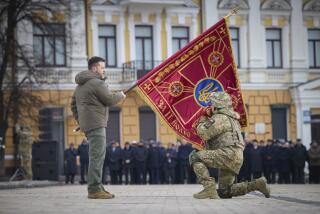Darkness in Lithuania : Stalin-esque crackdown overshadows perestroika
- Share via
Budapest, 1956. Prague, 1968. Vilnius, 1991. Each time Soviet tanks were sent to crush subject people who had become bold enough to resist Moscow’s rule. Each time the brutal crackdowns were accompanied by similarly unbelievable claims.
The independence movements that the Red Army extinguished in Hungary and Czechoslovakia were condemned as “counter-revolutionary,” a designation that automatically put them beyond the pale of Soviet tolerance and made military force obligatory. In Lithuania, Soviet Defense Minister Dmitri Yazov said Sunday, the army responded to an appeal from a largely anonymous group of quislings, the National Salvation Committee, to stamp out a “bourgeois dictatorship.” With this sneering epithet, Lithuania’s democratically elected and demonstrably peaceful government is reviled and dismissed. An accusation of bourgeois dictatorship is not the language of perestroika in the 1990s, but the reflexive lie-telling of an earlier, shameful era of Soviet history.
Astonishingly, perhaps incredibly, President Mikhail S. Gorbachev says he knew nothing of the military repression in Vilnius--with its toll of 14 killed and scores left injured--until after the shooting stopped. Is it possible that the head of the Soviet state and commander in chief of its armed forces, who only hours earlier had promised there would be no further use of military force in Lithuania, lacked foreknowledge of what could turn out to be the decisive political event of his tenure?
Either Gorbachev is not being honest, in an effort to distance himself from an ugly and condemnable act and so prevent further diminishing of his international stature, or he is telling the truth, in which case he is implicitly admitting that subordinates in the government and Communist Party are now operating outside his control. Both possibilities are profoundly disturbing. The first because it raises anew the fundamental question of whether Gorbachev can be trusted when he professes still to be committed to progressive change; the second because it constitutes a virtual admission that he has become the front man, if not the captive, of the most powerful reactionary forces in official Soviet life.
Foreign Minister Eduard Shevardnadze passionately warned about the ascendancy of those forces when he announced his resignation a few weeks ago. His has not been the only Soviet voice sounding the alarm over Gorbachev’s drift to the right. In a somber article in the current New York Review of Books, the historian and radical deputy Yuri Afanasyev asks whether “the initiator of perestroika may become its destroyer.” That thought has been in the back of many minds for some months. The crackdown in Lithuania has brought it to the forefront of concern.
The harsh and unmistakable message of the military takeover in Lithuania won’t be misheard in those other republics that have also declared their sovereignty. Whatever reforms Gorbachev intends to pursue in the time left to him are feasible only if the territorial integrity of the Soviet state can be maintained. If that requires using tanks and troops to coerce order and obedience, then, as events in Vilnius have made clear, tanks and troops will be used.
But the turn to force won’t be cost- free. The Western world that has looked to Gorbachev with such great hope is being anxiously compelled to re-examine its assessments and expectations. “Partnership,” said Secretary of State James Baker, “is impossible in the absence of shared values.” There are many in the Soviet hierarchy, including Gorbachev’s recent choice for interior minister, Boris Pugo, the former KGB boss in Latvia, who have only contempt for the notion of shared values with the West. Others, the modernizers and technocrats who know how vital Western help will be to future Soviet development, know better. For now, and maybe even for some time to come, the reactionaries seem to have won out. The tanks that swept through Vilnius may have put a bloody signature to the all too brief chapter of promised Soviet reform.
More to Read
Sign up for Essential California
The most important California stories and recommendations in your inbox every morning.
You may occasionally receive promotional content from the Los Angeles Times.













